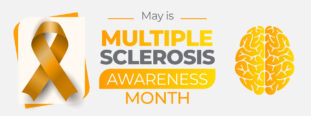What works for depression?
Many people with multiple sclerosis suffer from symptoms of depression and anxiety. Up to 1 in 4 people may develop depression during their course of MS, and about 1 in 5 will experience anxiety (Marrie and colleagues. Mult Scler 2015;21:305-317). Other studies have suggested that a majority of people will experience a degree of depressed or anxious symptoms at some point (Chwastiak and colleagues. Am J Psychiatry 2002;159:1862-1868).
“Depression” can be thought of as a constellation of symptoms that typically are both psychological and physical in nature. So it is distinctly different from just “a case of the blues”. Common mental symptoms of depression include a depressed mood, anger or resentment, loss of enjoyment in pleasurable things (called anhedonia), difficulty concentrating, and feelings of hopelessness or helplessness. Physical symptoms may include weight loss or weight gain, fatigue, and difficulty falling asleep. One challenge in identifying depression is that some of the symptoms (such as fatigue or difficulty concentrating) are also common symptoms of MS.
Why people with MS are more prone to depression isn’t well understood. There have been suggestions that depressed symptoms may be associated with lesion activity in the brain, or may be attributable to the immune system dysfunction that is characteristic of MS (Rabins and colleagues. Brain 1986;109:585-597; Foley and colleagues. Arch Neurol 1992;49:238-244). But these are largely speculative, and there is little evidence for a biological basis for depression.
People with depression often experience significant anxiety, but anxiety disorders can also occur independently of depression. Anxiety is often treated with antidepressants since there are concerns about the addictive potential of medications that target anxiety, such as Valium and Xanax. The other option is psychological interventions, including cognitive-behavioural therapy (CBT), one-on-one counselling, group therapy, telephone or computer-based counselling, acceptance and commitment therapy, and physical activity counselling with motivational interviewing. The different therapies may help people identify negative thoughts, change behaviours, identify/overcome problems, work on relationships, encourage self-acceptance, and so on.
Unfortunately, few studies have looked at whether medications or counselling are effective in depressed people with MS. Researchers at the University of Manitoba recently analysed 13 studies to get a sense of what treatments work best in MS (Fiest and colleagues. Mult Scler Relat Disord 2016;5:12-26). Overall, the group favoured psychological interventions, but the effects were somewhat modest. For example, a 12-week telephone counselling program to encourage people to be more physically active found that people generally reported less severe symptoms of depression, but the results were more promising than conclusive (Bombardier and colleagues. J Consult Clin Psychol 2013;81:89-99). Getting some form of help is probably more important than the type of help, and the specific counselling needs will depend very much on the individual and his/her life circumstances. The key limitation to psychological therapies is access – it can be difficult to find a counsellor you like, they may be booked for the next six months, and your insurance may not pay for it.
Medications can provide some relief for some, but they can be a mixed blessing. Few studies have looked at the effectiveness of antidepressants specifically in people with MS. In the three drug studies included in the Manitoba analysis, all demonstrated some improvement in depressed symptoms. In a study of paroxetine (Paxil, Seroxat), a selective serotonin reuptake inhibitor (SSRI), just over one-half of the study subjects responded to treatment, but this was only slightly higher than the response rate with a placebo (Ehde and colleagues. Gen Hosp Psychiatry 2008;30:40-48). Another SSRI, Zoloft (sertraline), was shown to be about as effective as CBT (Mohr and colleagues. J Consult Clin Psychol 2001;69:942-949). The third study used desipramine (Norpramin), an older type of antidepressant; it was effective, but side effects limited its use (Schiffer and colleagues. Am J Psychiatry 1990;147:1493-1497).
Other antidepressants that have been specifically studied in MS are Cymbalta (duloxetine), Luvox (fluvoxamine), Manerix/Aurorix (moclobemide) and Tofranil (imipramine) (Solaro and colleagues. Clin Neuropharmacol 2013;36:114-116; Benedetti and colleagues. J Neuropsychiatry Clin Neurosci 2004;16:364-366; Barak and colleagues. J Neuropsychiatry Clin Neurosci 1999;11:271-273; Dean G. S Afr Med J 1969;43:86-87).
As a general rule, these studies have found that antidepressants can be a help to some (but not all) people suffering from depression. So finding the right medication may require some trial and error. The major limitation of antidepressants is their side effects. Some of these effects (such as fatigue, dry mouth, and urinary retention) can worsen MS symptoms; other effects (such as nausea) may compound the side effects that you may be experiencing with your MS medication.
Depression and anxiety are serious conditions that can have a major impact on a person’s quality of life, relationships, and day-to-day functioning. MS is difficult enough without the added burden of depression and anxiety, so it’s important to report symptoms to your family doctor or MS clinic nurse, who can arrange a referral to a psychologist or psychiatrist. Some self-help strategies, such as regular exercise, yoga, and mindfulness training, can also provide some relief from depressed and anxious feelings.
Share this article
Facebook Twitter pin it! Email
Related Posts
Back





